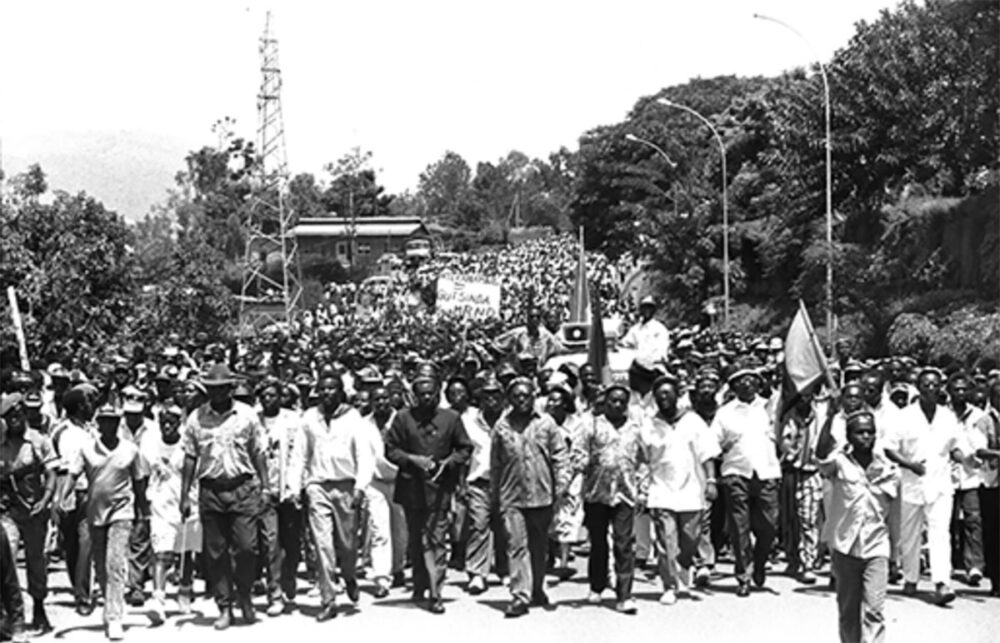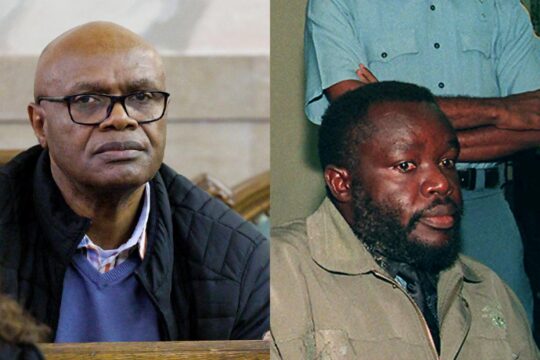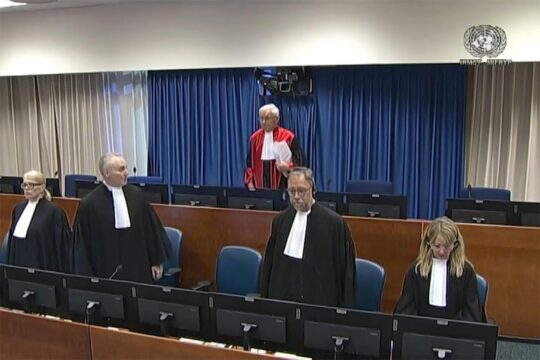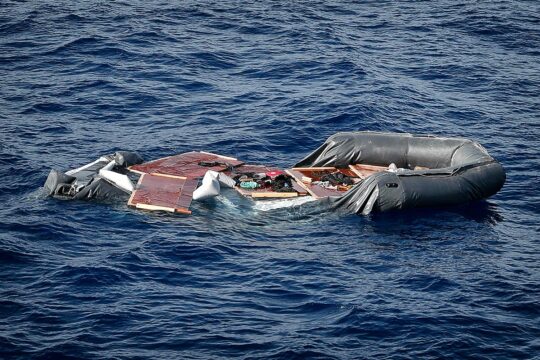The Brussels Assize Court wanted to hear Dieudonné Niyitegeka, former treasurer of the National Committee of the Interahamwe in Rwanda in 1994, but at the last minute on April 18 he refused to appear on screen. Under protection in Canada since his collaboration with International Criminal Tribunal for Rwanda (ICTR) prosecution, Niyitegeka was due to be heard by videoconference in the large room where the Brussels Assize Court is currently sitting to try Emmanuel Nkunduwimye. Niyitegeka was questioned by Canadian police as recently as March 18, after the court president ordered his hearing in January. Faced with a public hearing, he failed to appear.
Nkunduwimye has been on trial in Belgium since April 8. He is accused of belonging to the Interahamwe and participating with them in the killings. Niyitegeka was therefore expected to be a key witness. In his absence, the magistrate read out the transcript of his questioning in March. The two-hour transcript does not spare Nkunduwimye, who is presented in this trial as an inseparable friend of Georges Rutaganda, then second vice-president of the Interahamwe National Committee. Rutaganda, convicted of genocide by the ICTR in 2003, died in prison in 2010. At the opening of his trial, Nkunduwimye accepted for the first time the conviction of his former friend, which he had until then considered “political”. But he maintains that he had no authority over the militiamen.
“He was a thief, a rogue”
“They [the Interahamwe based in Amgar, a building shared by Nkunduwimye and Rutaganda] controlled the town,” Niyitegeka told the Canadian police. “They went to recover houses, stolen household items and cars. Bomboko [Emmanuel Nkunduwimye] and Zuzu [Jean-Marie Vianney Mudahinyuka] would take the cars to Bukavu [across the border in the Democratic Republic of Congo] to sell them.”
Nkunduwimye was not Interahamwe, Niyitegeka added. He never saw the accused at militia meetings before the genocide. “He took advantage of the opportunity, because he and Georges knew each other. But he was a thief, a rogue. He influenced Georges. He used to say: ‘if you don't get rich during the war, you won't get rich after the war’. He was the one who organized all these killings, the attacks on women, moving people in exchange for money. That was him. He didn't have an official position, but he was always with Georges. They lived together day and night, because they worked at night. They'd go out to steal or fetch money, or they’d take stolen cars to Bukavu.”
A surprise for Mbarushimana
Niyitegeka was not the only former Interahamwe leader to be eagerly awaited in court. The day before, the court had subpoenaed another central figure in the hierarchy of the Interahamwe National Committee: Eugène Mbarushimana, its former secretary general. Mbarushimana lives in Belgium. On April 17, he turned up at the courthouse. But it was the court that finally had to give up hearing him, because there was a surprise: although Mbarushimana had been known as a refugee in Belgium for almost 30 years, it was revealed that an investigation was underway against him by the Belgian Federal Prosecutor's Office, although he was not yet aware of it. This information was dropped at the hearing by the prosecutor, who seemed uncomfortable. Suddenly fearing that the witness might incriminate himself in his own case, the president preferred not to hear him.
Mbarushimana is the only one of the 11 former Interahamwe leaders -- five members of the national committee and the six commission presidents -- not to have been an “informer” for the ICTR prosecutor, not to have been prosecuted, or died. He was, however, strategically positioned: he is the son-in-law of Félicien Kabuga, richest businessman in Rwanda in 1994 who was linked by marriage to the presidential family and presented as “financier” of the genocide. But ICTR investigators failed to gather enough evidence against Mbarushimana, because he was one of the privileged few authorized to flee Rwanda aboard a French plane as early as April 12, 1994. ICTR investigators wanted to use him as bait to arrest his father-in-law Kabuga, but in vain. Kabuga was arrested near Paris after 23 years on the run. In August 2023, his trial before international justice was halted on grounds of senile dementia.
The judicial fate of Interahamwe leaders
As with Niyitegeka, the court was reduced to reading the statement Mbarushimana made to investigators on April 5, 2011, less than a month after Nkunduwimye's arrest. “I didn't go to Amgar during the events. I didn't even drive past,” he told the Belgian police. “I didn't meet Georges Rutaganda after April 6. As far as I know, he stayed in Amgar before leaving for Cyangugu and Bukavu. [...] I learned later that Bomboko [Emmanuel Nkunduwimye] was also in Amgar. Rumour had it that they were involved in ‘Kubuhoza’, which consisted of taking the property of people who had left.” Mbarushimana said he was “not aware of any meetings of the Interahamwe National Committee held there [in Amgar]. I've heard about these informal meetings, but I can't say what they were about or who was there”. The militia’s former secretary general remained faithful to a line that has protected him from prosecution until now: he says he neither saw nor heard anything directly. He also confirmed that he “never saw Emmanuel Nkunduwimye at any of the Interahamwe meetings”.
Such has been the judicial fate of the former leaders of this militia, considered to have spearheaded the Tutsi genocide. Of its 11 former leaders, all are presumed dead today except Niyitegeka and Mbarushimana, who have never been tried. Three have been tried and convicted: Rutaganda plus Ephrem Nkezabera and Joseph Serugendo, both of whom were part of the network of informers set up by Niyitegeka on behalf of the ICTR prosecutor. They were convicted -- the first in Belgium, the second at the ICTR, shortly before succumbing to illness. Robert Kajuga, president of the Interahamwe, is said to have died in the refugee camps in Congo shortly after the genocide. The fifth member of the national committee, Phénéas Ruhumuliza, died of illness in Côte d'Ivoire, where he had been discreetly evacuated by the ICTR for services rendered to the prosecutor. The other four committee chairmen are all presumed dead.








